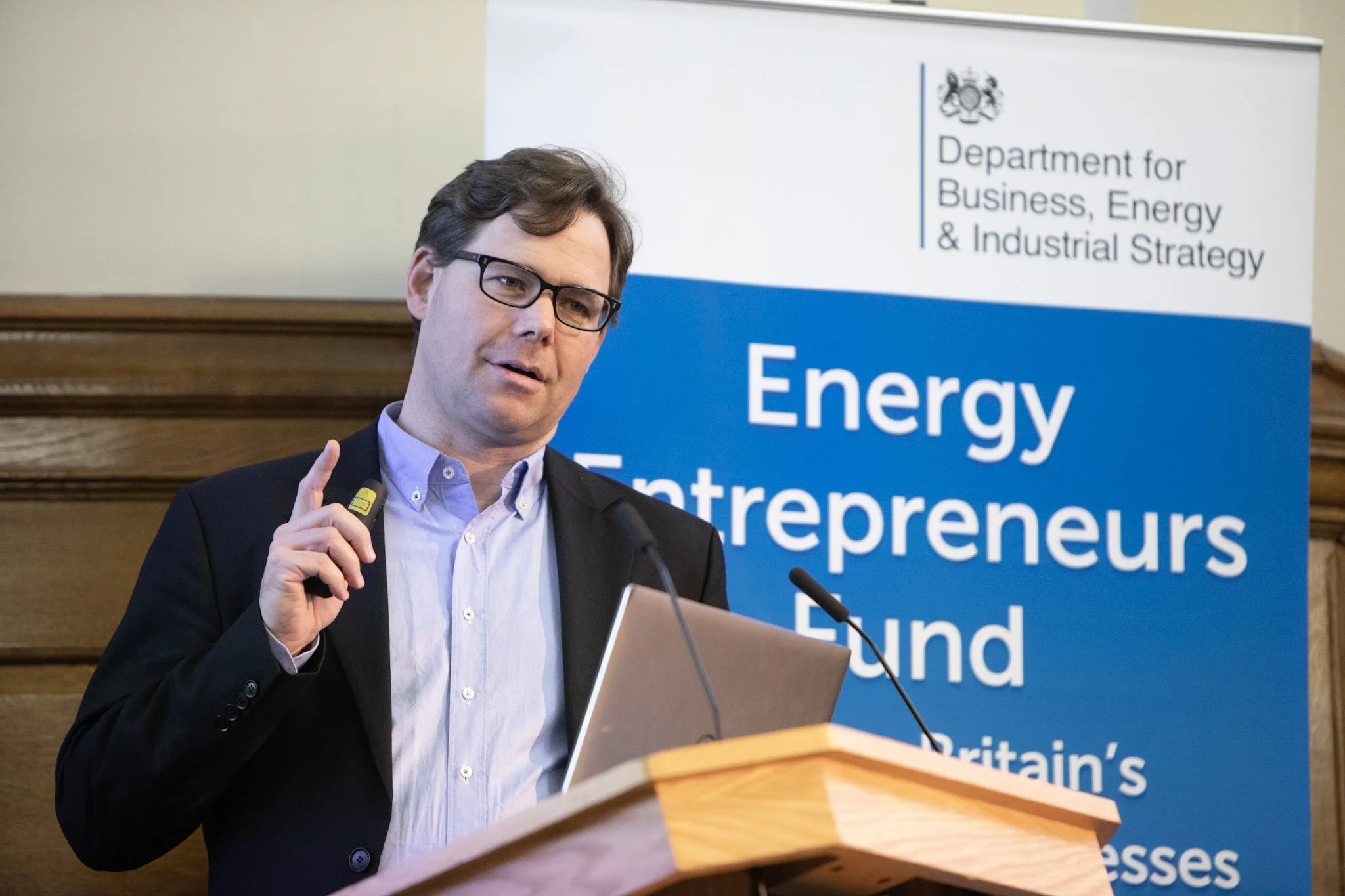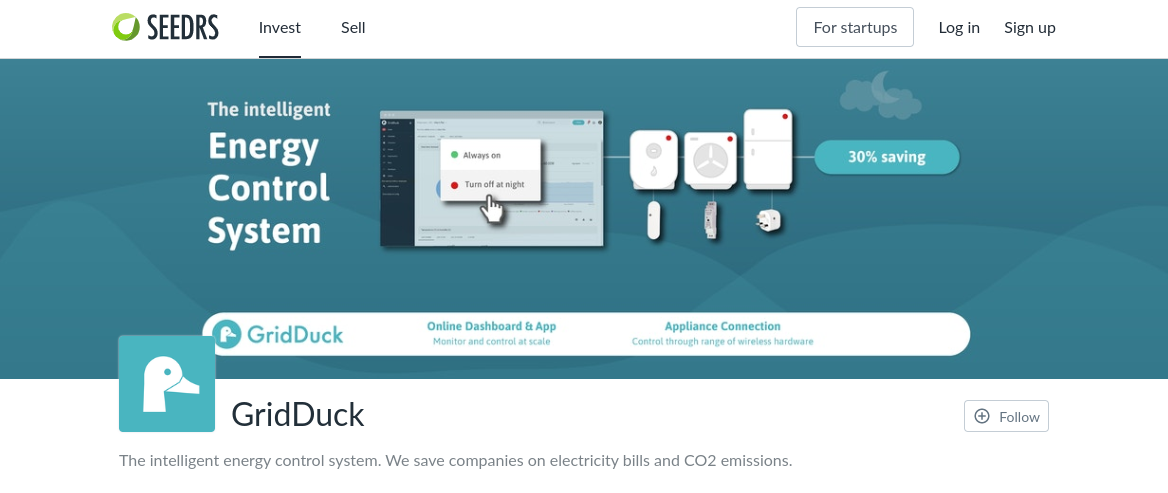The Time to Invest in Energy Saving: GridDuck CEO, Gregor Hoefter, Talks All Things Fundraising
We’re GridDuck, the business that helps other businesses save energy and reduce their carbon emissions through a wireless monitoring system. Our vision is to use tech to help us live more sustainably and make a positive impact on the planet.
We’re still a young company and we’re growing fast. Like many entrepreneurial ventures, we anticipated a problem that required an innovative solution. As the energy sector continues to make headline news, that solution is more vital now than ever.
We’ve got ambitions we want to share with the world, but we need investment. You can share in our growth by becoming one of our investors. Already, more than 200 people believe in our mission and prospects for profitability. Why should you join them?
Gregor Hoefter, GridDuck’s founder and CEO, makes his pitch and talks tech, teamwork and timing.
GridDuck CEO, Gregor, speaking at Energy Entrepeneurs Fund
We’re living through some difficult times and many are tightening their belts. Why should people look to invest in GridDuck now?
As the saying goes, timing is everything. It’s hard to escape the gloomy picture surrounding energy prices right now. Everyone is affected, from households through to businesses. No sector of the economy is untouched. In the last few years, electricity prices have tripled while carbon has doubled. Gas prices have never been higher. That has driven up inflation, and is now causing turbulence in financial markets. As the crisis bites, more and more of us are looking for ways to optimise our energy consumption and eliminate waste.
It’s regrettable, of course, that it took an energy crisis to cause people to start seriously looking for sustainable solutions to energy waste. In reality, our world has needed all of us to become more energy efficient and reduce our overall carbon emissions for a long time now.
We were recently chatting with a small restaurant chain in the West Country. Energy used to be 1-2% of their profit and loss, now it’s 7% or more. If you think that someone’s net profit margin in a restaurant might be five or 10%, you suddenly see that energy can take you from profitability to loss.
We’re currently working with a food delivery service to measure their electricity, gas and water. They run multiple sites which have between eight and 12 dark kitchens. We’re expecting more of these types of businesses asking for our technology to help them save money.
What has been the joy of starting this business?
I started GridDuck on a hunch about where things were headed, but I went out and started talking to people and it led to where we are now. We’ve come a long way and the technology and platform is much more comprehensive than I initially thought.
This is a testament to the team – they have basically created this company themselves through their hard work and expertise. They are very entrepreneurial in the sense that they foresee problems I often don’t see myself and create solutions for those problems. You don’t get this from a large company with many employees because there’s usually more of a process.
Don’t get me wrong, being an entrepreneur can be stressful at times, but it also has big advantages.
Every startup faces challenges. What have been some of your biggest?
One major challenge is that we go into different types of buildings to install our cloud-based monitoring system. We found that we couldn’t easily run trials to test the product. With a purely digital service, you can tell people that you’re in the Beta stage and that improvements will be made in time. People simply accept that. That wasn’t possible with a commercial building – it had to work from the word go.
Another challenge is a bit like chicken and egg. When we started out and were talking to potential clients about the benefits of using our technology, people wanted evidence from their sector. You couldn’t talk to a farmer about how it worked for a cocktail bar, and you couldn’t talk to a factory about the benefits we found on a farm.
So, it was tricky to get our first customer in a sector. We finally got lucky and then one case study got us five or six clients. From there, it became easier – we knew what to do, what to analyse and how to provide value to individual sectors.
Who are your competitors? How are you different from them?
We got in there first with our target market and it would be hard for someone else to do the same as us now. Some of our competitors integrate with existing building management systems that you find in very large, sophisticated buildings. For example, five-star hotels, airports, city-centre buildings, and big offices. These will already have some sort of building management system that will automate functions such as heating and air-conditioning. They tend to be energy-efficient by design.
You’ll find GridDuck’s wireless monitors in factories, warehouses or companies that have multiple sites. These are usually places where you wouldn't find a building management system because the cost didn’t stack up, or it was never considered necessary. This is our USP.
We’ve partnered with a range of businesses, from a government department to other start-ups. You can even integrate our system with renewables, automating functions so that you maximise the energy you get from solar panels, for example. It’s all controlled remotely through an intuitive dashboard and app.
What kind of investors are you looking for?
We’re running our campaign through Seedrs, a crowdfunding investment platform. Anyone can invest in us. The minimum investment is low, from just £10. This is one of the benefits of using crowdfunding – it has made it possible for anyone, with any budget, to become an investor.
The valuation of our company is very reasonable compared to others in the crowdfunding space and our revenues are now growing strongly (18x over the last 12 months). We’re profitable at a unit level, which is a big thing for us.
We have a couple of big investors who believe in us. Evenlode Impact is a small fund that invests for impact, Veridian Ventures is an angel group which focuses on innovative, early-stage companies that can demonstrate growth and value-creation potential. Both of these have invested twice. And we have a large number of individual investors too.
When you invest in GridDuck you will be investing in the positive impact we make on our planet, as well as potentially earning a return. This will make you part of a growing number of people who are impact investors. Of course, any investment carries risk and we’d be irresponsible if we didn’t make that clear.
What will you do with new investment, assuming you meet the target?
We’re looking for an investment of £290,000 to continue to expand our sales and marketing. We initially started with cold calling but as we are maturing, we are adding digital lead generation. We have a growing team that converts those leads into sales. We want to refine that method so that for every pound you put in, you get £1.50 out.
Our growth really tells the story – we have grown our annualised recurring revenues by 18x since May 2021, our device sales grew by a similar multiple, and we were breaking even last month.
Find out more about our campaign through our page on Seedrs. If you have any questions, contact us, we’d be happy to tell you more!



